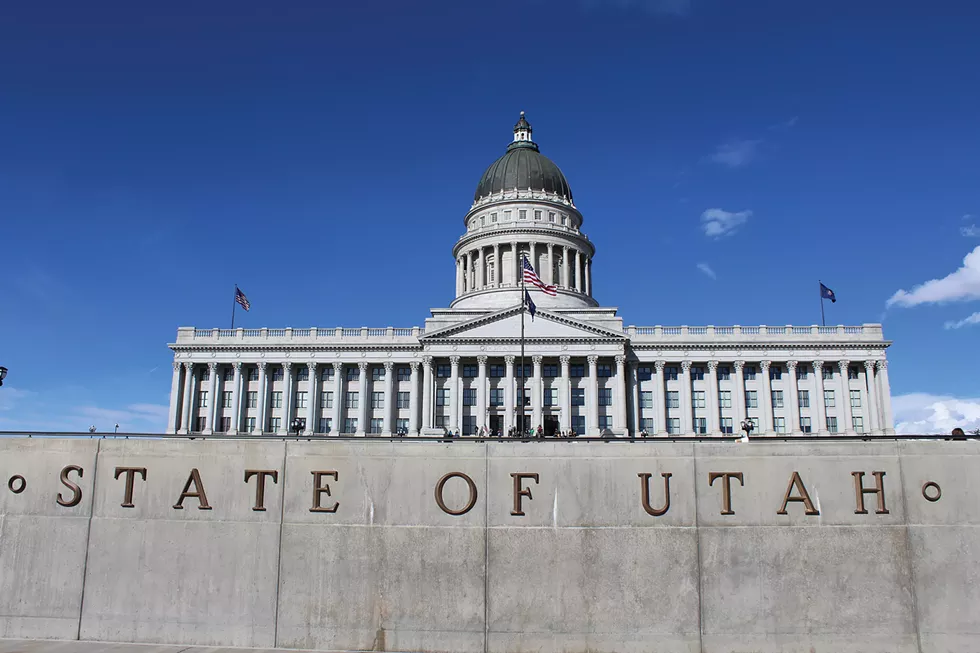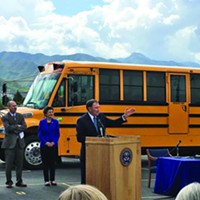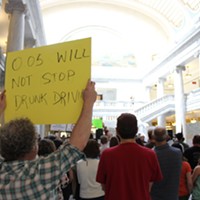
- Enrique Limón
- The 2017 legislative session concludes this week at the Utah State Capitol.
Where has the time gone?
In its waning days, the Legislature's speed will shift, as it always does, from its humdrum business-as-usual pace into a chaotic urgency. Yes, this week, lawmakers scramble to get their bills passed or heard before adjournment late Thursday night. It's a time-honored script.
In many ways, the 2017 session resembled those that came before. As commonplace as a smog-soaked day in the Salt Lake Valley, the perennial legislation topics—alcohol law, school funding, abortion, pornography—reared up and demanded our attention. Those topics are the ones that grab the headlines among the 1,500 or so bills introduced.
In between committee hearings, floor votes and lunch with lobbyists, legislators were privy to a time-tested American ideal: the right to assemble.
This year, the statehouse was flooded with massive demonstrations, some of which—like the Women's March and the March for Refugees—were modeled after national movements. Other protests would only make sense in a state like Utah, such as the pro-polygamy rally that called back to the state's precarious plural-marriage past. And Utah's unparalleled natural beauty and untapped natural resources drew crowds on both sides of the national monument debate.
When historians look back on 2017, it's reasonable to think they'll take a long look at Bears Ears, rape kits and the Zion Curtain.
Bears Ears
And the storied fight over public land rumbles on. The newest 3.5-million acre battleground, Bears Ears National Monument, is found in Utah but falls under federal rule, giving state lawmakers who oppose the federal regulations little recourse.
It was in late December when then-President Barack Obama declared the buttes in southeastern Utah a protected monument. Locally, the announcement was drowned out by consternated cries from Utah higher-ups, and the legislative session gave monument naysayers a space where they could put their words into action.
So, in response, local officials zipped a non-binding resolution through the Capitol that, in essence, asks President Donald Trump to erase the monument his predecessor created, an option that has never been attempted and might not be legally available. Furthermore, based on his stream-of-consciousness speeches and Twitter feed, Trump doesn't spend a great deal thinking about public land issues.
To that end, the measure that was passed in Utah this session is more a symbolic move, a statement about overreach, an amplified gesture.
Gov. Gary Herbert made this clear when he spoke to outdoor retailers on a recorded conference call.
"The resolution really means nothing. There is no teeth to it," he said. On that same call, he asked industry leaders for more time before they crossed Salt Lake City off the list of future Outdoor Retailer trade shows.
Outdoor companies were peeved by the Bears Ears rhetoric leading up to the session, and they were bitterly disheartened when the resolution passed. On the phone with Herbert, representatives from The North Face, REI and others indicated they wanted the governor to publicly disavow his previous position. But it was an ultimatum Herbert wasn't willing to concede, nudging organizers of the large biannual convention—a Salt Lake City staple for two decades—to shop elsewhere.
Not only that, but the company heads informed Herbert that the capital city would no longer be considered for a major bike convention, either.
And with that, a "no teeth" resolution came back to bite the local economy to the tune of $50 million annually. If that incision doesn't sting enough, a coalition of business owners near the Grand Staircase-Escalante National Monument met at the Capitol to testify about the economic boon that monument brought to the region—the opposite narrative coming from Utah's elected leaders.
Liquor
Ever since 2009, when restaurants were suddenly required to mix cocktails away from the public gaze, business owners have sought to do away with the rule, finding it arbitrary and restrictive.
Each new establishment was forced to construct a barrier, or Zion Curtain as it's been dubbed. The food industry pushed against the law on grounds that it was costly, ineffectual, and patrons found it odd.
But in years past, they've found little success. Perhaps because the legislator who drafts alcohol law is liable to get chewed up like chum, to copy a metaphor used by Utah Restaurant Association President Melva Sine.
"The minute we mention alcohol, it's like throwing tuna to sharks—and everybody is in the water," she says.
As the legislative session neared, however, rumors began to swirl that this was the year lawmakers could topple the wall.
That brings us to Rep. Brad Wilson, R-Kaysville, who intrepidly dove deep into the drink. He attached his name to a mammoth bill, concocted with a squeeze of regulation, a twist of tax hikes, equal parts training and education, and voilà: House Bill 442.
For restaurateurs, it offers a couple options in lieu of the mandated Zion Curtain. Instead, they can enforce a buffer separating the bar from family dining areas (politicos seem to, at this point, favor calling it the "Zion Moat"), or they can separate areas where drinking is permitted from those where it is not with a 3.5-foot-high "half wall."
If they so chose, restaurants can also keep a curtain.
Several establishments were considered "grandfathered" restaurants in 2009, and they didn't have to build a Zion Curtain. The new bill would now require that they comply with one of the three options by July 1, 2022.
And for grocery stores and gas stations, they will have to display beer or "alcopop" in distinct spots, so no one unwittingly purchases an alcoholic beverage, like a Utah woman, Wilson claims, who mistakenly served alcoholic root beer picked up at the grocery store to her grandchildren over the Christmas holiday.
Although this is a working compromise for some, others asked lawmakers for more time to study the 150-plus page piece of legislation to determine how it would affect their businesses. Some restaurants have concerns that the new requirements will be just as onerous. Certainly, owners have been clamoring for the Legislature to pedal back the wall requirements, arguing that patrons, on the whole, prefer to see what's going in their drinks.
Restaurants that demolish their Zion Curtains risk losing business from at least one customer, though. Specifically, the patronage of ultra-conservative Utah Eagle Forum president and Capitol omnipresence Gayle Ruzicka—when she dines with her grandchildren.
On a recent outing, she told House committee members, she peered at an eatery's Zion Curtain, grateful that she and her grandson were shielded from the alcohol behind it. While admiring her obscured situation, Ruzicka asked herself whether she would return if the youngster by her side "could look over there and he could watch them preparing the alcohol, looking at those drinks that look very enticing. ... I thought to myself, 'Shame on me if I would.'"
But plenty of others will. Customers who imbibe at the restaurant, however, should be aware of an important liquor change promoted by Norm Thurston, R-Provo. Utah liquor laws drew national attention when they proposed lowering the legal blood-alcohol driving limit to 0.05 percent, from 0.08.
Thurston argued his new law will lead to fewer fatal accidents on the road.
No other state in the nation has set its DUI limit lower than 0.08. But, Thurston says, plenty of nations in the world have, and 0.05 seemed, to him, to be a reasonable line.
Fighting Rape
Fortifying her reputation as a leader in the fight against sexual and domestic violence, Angela Romero, D-Salt Lake City, introduced House Bill 200, a measure that mandates the testing of rape kits.
A member of a sexual violence task force, Romero says although a bill for mandatory rape kit testing is new this session, she and other colleagues—notably Eric Hutchings, R-Kearns—have been working on it for several years. She attributes this to the bipartisan support for the measure.
"I wasn't sure it would pass the first session because you're never sure when you're tackling an issue like this, but I think my colleagues respect the fact that we've done our research," she says.
The notion that someone would oppose a law that could lead to the lockup of rapists is hard to fathom. Less so is a concern over the fiscal note, which is estimated at about $2.4 million.
"This is the right thing to do," she says, when asked about the cost. "It affects all of us."
Whether or not the increase in rape kit testing leads to a measurable uptick in rape convictions, Romero says this bill will offer some solace to victims, who might otherwise feel like no one believes them.
"Somebody has experienced a horrific crime, and then they go and get an exam and that's invasive," Romero says. "It can retraumatize someone. I wanted to make sure that they feel that justice is served even if the perpetrator isn't caught."
Romero also sponsored legislation to help victims of sexual or domestic violence on college campuses receive support.
"When we look at sexual violence and domestic violence, most people blame themselves," she says. "Most people are afraid to disclose because they don't think they'll be believed. So they need that confidentiality and that support system to be able to process it and move forward."
Another bill meant to curb sexual assault would allow students to carry concealed guns on campuses.
"What about the alleged perpetrator? They can carry, too. It doesn't really solve the issue at hand when we're talking about sexual violence," Romero says. "We should be talking about consent. I don't think guns really have a role in that conversation."
Pain in the Neck
What's a guy gotta do to get a neck massage around here? One has to assume, Sen. Todd Weiler, R-Woods Cross, was asking this same question while lounging on a barber chair, when he conjured up the bill that has rolled the most eyes this session.
If you've ever longed for your barber to give your neck a little squeeze after brushing hair clippings from it, but never got one, Weiler has your freshly styled back.
What Else Is in It?
Often enough, a piece of legislation intended to address one problem also includes language meant to fix or clarify a related one. For example:
House Bill 442, the alcohol behemoth includes a 2-percent tax hike on alcohol sold in restaurants—a cost that will surely be passed along to customers. Rep. Brad Wilson estimates it will generate about $4 million, to be used for education programs and training, pay for administration costs at the Department of Alcohol and Beverage Control, and any leftover would go back to the general fund.
House Bill 200, which mandates the testing of rape kits would also help law enforcement with trauma counseling. The intent is to ensure victims of sexual assault don't regret reporting rape or violence because the investigation of a well-meaning officer is nevertheless compounding the trauma.
The massage-with-a-haircut measure, Senate Bill 172, included a two-minute time limit for any neck rub. That language was removed, though, after committee members poked fun at how ridiculous it would be to enforce.





